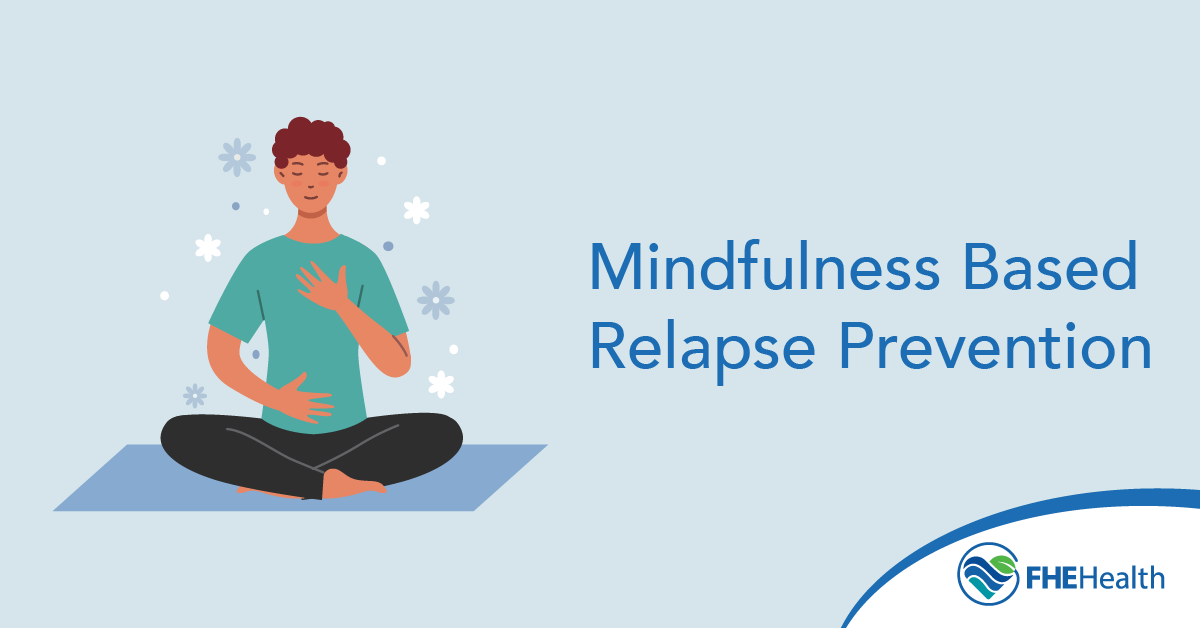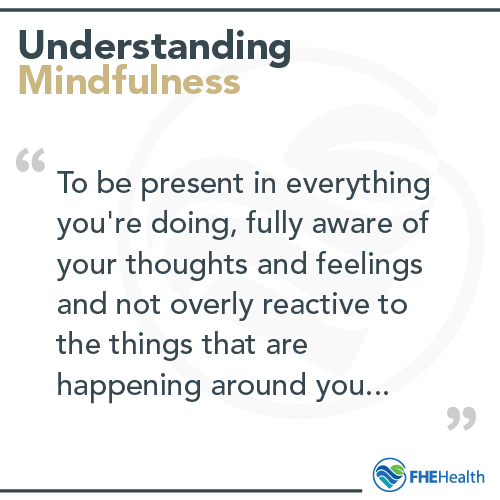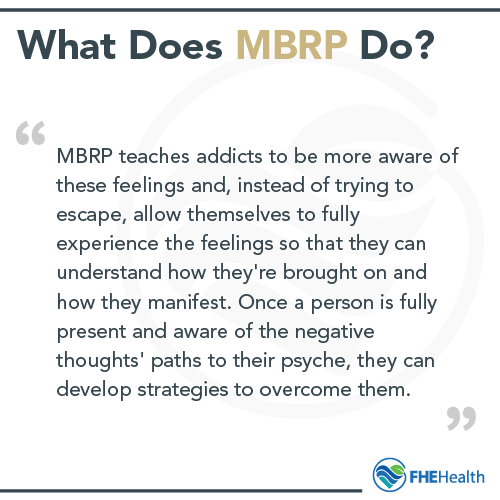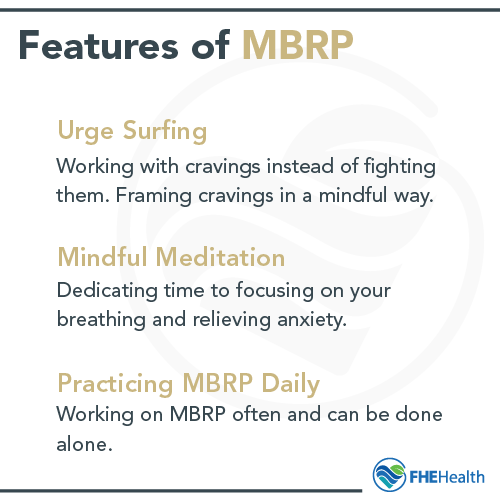
Relapse is a challenge for many people in recovery. According to the National Institute on Drug Abuse, 40% to 60% of people with substance abuse disorders experience a relapse at some point.
Just hearing statistics like that can be disheartening for people in recovery. Fortunately, a tactic called mindfulness-based relapse prevention (MBRP) has shown potential for reducing relapse rates and improving outcomes across the board.
You may have heard the word “mindfulness” so many times that you’re not sure if it really means anything, and it’s true that the concept has been overused in recent years. But here, we’re going to be talking about the concept of mindfulness in the context of a strategy for long-term sobriety. A tactic called mindfulness-based relapse prevention (MBRP) has some potential for those undergoing treatment and in recovery. Specifically, you’ll learn how to maintain sobriety using mindfulness worksheets for addiction.
At FHE Health, we’re committed to continually learning more about the latest therapies and techniques used in recovery for the good of our patients. Keep reading to learn how mindful relapse prevention strategies could be the key to successful treatment and recovery.
Adopting a More Present Mindset
 Mindfulness means being present in everything you’re doing, fully aware of your thoughts and feelings and not overly reactive to the things happening around you. The concept of mindful meditation has become popular as a way to truly understand the intended outcomes of meditation.
Mindfulness means being present in everything you’re doing, fully aware of your thoughts and feelings and not overly reactive to the things happening around you. The concept of mindful meditation has become popular as a way to truly understand the intended outcomes of meditation.
This concept has been applied in several clinical areas, including mindfulness-based cognitive therapy (MBCT). This approach combines the tenets of mindfulness — being completely present — with cognitive therapy (CT), which centers on the person in counseling understanding their thought processes and actions on a deeper level. The goal of MCBT is to help people with psychological issues like depression, anxiety and panic disorders.
What Is MBRP?
Mindfulness-based relapse prevention (MBRP) is an evidence-based alternative to 12-step programs such as Alcoholics Anonymous. While most 12-step programs emphasize peer support and spiritual growth, MBRP focuses on the biggest predictors of relapse: negative thoughts and cravings.
Benefits of Mindfulness-Based Relapse Prevention
Mindfulness-based relapse prevention helps you recognize triggers and cravings before they lead to relapse. You learn to observe negative thoughts without judgment and respond intentionally rather than reacting impulsively.
MBRP encourages self-awareness, emotional regulation and mental resilience. You may find yourself more patient with setbacks, better able to manage stress and more connected to your emotions during recovery. Unlike approaches that focus solely on abstinence, MBRP gives you practical tools to navigate the everyday challenges of sobriety.
Using Mindfulness Worksheets for Addiction
Mindfulness worksheets for addiction are self-guided tools that help people understand their thoughts and addiction triggers so they can recognize them before falling into relapse.
A key focus is framing your thoughts in a positive light and reinforcing the benefits of mindfulness. For example, instead of thinking about a time you gave in to your addiction cravings, a mindfulness worksheet might instruct you to describe a time when mindful breathing helped you overcome the urge to use alcohol or drugs.
Typical writing prompts on mindfulness worksheets for addiction include:
- Describe how mindfulness makes you aware of your cravings.
- Write about the last time you used mindfulness to overcome an urge to use.
- List three ways mindfulness has facilitated your recovery journey.
- Reflect on the mindfulness practice you’ve found most helpful.
Mindfulness versus 12-Step Programs
While 12-step groups offer community support, accountability and structure, they rely heavily on peer sharing and spiritual principles. Mindfulness-based relapse prevention emphasizes self-awareness and personal strategies for coping with cravings and negative thoughts. Key elements of MBRP include:
- Sensory awareness. You practice noticing how taste, smell, sight and sound contribute to autopilot behaviors.
- Craving identification. You track triggers and use exercises to counter automatic responses.
- Thoughts and emotions. You reflect on patterns leading to relapse and practice mindful decision-making.
- Review and planning. You discuss strategies learned and create an environment that supports sobriety.
Being Mindful of Negative Thoughts
 Addiction is commonly associated with negative thoughts, self-deprecating behavior and low self-esteem, which is partly why mental health and addiction are inexorably linked. One study showed people with higher mental resilience are less prone to destructive coping behaviors such as binge drinking.
Addiction is commonly associated with negative thoughts, self-deprecating behavior and low self-esteem, which is partly why mental health and addiction are inexorably linked. One study showed people with higher mental resilience are less prone to destructive coping behaviors such as binge drinking.
Even for people who are sober long-term, negative feelings can show up in surprising ways. When hopelessness or escapism sinks in, many people are driven to start using again.
MBRP therapy teaches people to be more aware of these feelings and allow themselves to fully experience them so they can understand how and why they manifest. Once a person is fully present and aware of how negative thoughts occur and take hold in their mind, they can develop strategies to overcome them.
Being Mindful of the Effect of Cravings

Cravings are something we can’t control, but if we’re mindful of their presence, we can more easily resist their effects on the brain. Cravings can effectively rewire the risk-reward system in the brain by lowering inhibitions and making people more impulsive. A mindful way to approach this effect is to be fully aware of it and understand the consequences that result from impulsive behavior.
The Dialect of Mindful RP
Here are several terms you may hear where MBRP — or mindfulness in general — is being practiced.
Urge Surfing
In recovery, cravings and urges for any addictive substance or behavior tend to come in waves, but most people struggling with addiction do their best to suppress these waves. In circles that have embraced mindfulness for recovery or just as a healthier lifestyle, the practice of working with the cravings instead of fighting them is called “urge surfing.” The person metaphorically rides these cravings like a surfer rides waves.
Mindful Meditation
Like most mindful practices, MBRP programs often involve meditation. The belief is that being still and focusing on your breathing fosters an environment for self-understanding.
Practicing MBRP on a Daily Basis
One of the biggest advantages of a system like mindful relapse prevention is that it doesn’t need to be done with a group. In fact, it’s thought to be more effective when done alone.
To maximize the effectiveness of MBRP, it’s important to find a sober breathing space — a peaceful location without the temptations or triggers of your addiction. Additionally, you should incorporate MBRP as part of your greater relapse prevention plan.
Traditional MBRP in Group Settings
While an experienced addiction therapist typically conducts MBRP in group settings, you can adapt its protocol and use your own mindfulness worksheets for addiction.
Below is a summary of how clinicians have used MBRP through an eight-session program to help others overcome their addictions. See how you can incorporate these practices into your own MBRP program.
- Focus on taste and smell. The first session encourages participants to think about how different tastes and smells contribute to the mental feeling of being on autopilot. Participants concentrate on how being mindful of their experience can affect their thoughts and actions at that moment.
- Think about sight and sound. In the second and third sessions, participants note the various sights and sounds that trigger their cravings. They focus on using exercises throughout the day to help combat the triggers that place them into the autopilot mode that contributes to their addiction.
- Reflect on thoughts and emotions. Sessions four through six instruct participants to think about the thoughts and behaviors that precede a relapse while remaining aware of the present. Participants strive to stay mindful and create the habit of allowing themselves time to make less impulsive decisions.
- Discuss what you’ve learned. In the seventh and eighth sessions, participants go over what they’ve learned and discuss how they can create environments conducive to their sobriety.
The Bottom Line: Does MBRP Work?
Addiction is extremely complex, and so is addiction recovery. Different things work for different people. Two important things to remember here are:
- Relapse potential exists with all chronic conditions, such as addiction, diabetes and asthma.
- 12-step groups can provide you with community, structure and accountability needed to succeed in recovery.
Whether for overcoming addiction or general wellness, mindful meditation in all its variations has been helping Americans better themselves for decades. The National Health Interview Survey reports that the number of American adults using meditation to improve themselves increased by more than 100% between 2002 and 2022. If nothing else, MBRP is an option to reach certain people in recovery and give them the chance they need to succeed.
Frequently Asked Questions
Finding Support for Sobriety
Mindfulness worksheets for addiction make an excellent addition to a relapse prevention plan, but you don’t have to do it all alone. To learn more about cutting-edge treatment methods and therapies, contact FHE Health today.






